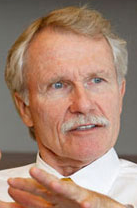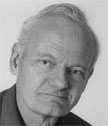 John Kitzhaber |
 Chris Dudley |
The happiest thing about what may be the only general election gubernatorial debate in Oregon this year was, each candidate invited the other to at least one more event. Democrat John Kitzhaber proposed next week's City Club in Portland; Republican Chris Dudley proposed a venue in Medford. Our recommendation: Compromise by doing both.
This evening's KGW-TV/Oregonian one-hour event, fast-paced and wide-ranging though it was, only scratched the surface, and Oregon voters would be a lot better served by seeing more.
No knockouts or massive gaffes seemed immediately apparent. Kitzhaber's command of detail and analysis was, as usual, instantly apparent, and his answers seemed generally stronger. His deep experience as well as skill in doing this sort of thing was obvious. The downside was a certain chill, a technocratic coolness. Dudley wasn't overrun - he projected energy and intelligence, if not depth of knowledge - anywhere. He held his own. (Both men proved capable of commanding the screen.) He said nothing very extreme or controversial (though he seemed at some times to be dodging). Here and there he seemed to veer toward anger, but mostly held himself in. The may also have meant he couldn't much use a personal charm that might have been a valuable asset.
Dudley did not really lack facts and figures, and against another opponent he might have looked more knowledgeable. As it was, he seemed to fall back on ideology and sloganeering - Do you want more of the same? We need a new direction - without much explanation or detail to back it up. Asked about his lack of governmental experience, Dudley took a shot at those who had served and said of himself, "What I offer is a vision." (Try getting a business loan, or selling a non-celebrity book proposal, based on that.)
Asked what was the biggest difference between himself and his opponent, Dudley said he wouldn't do "the same old thing." In this year, that might be a saleable line, but he was thin on what exactly would replace the "same old thing," or how his new thing would make things better. Kitzshaber several times (at the beginning and end and in between) filled in the gaps, saying Dudley would adopt George W. Bush-style policies and ideas and open up yawning revenue gaps. "There's a difference between a new face and a new idea," he said - a strong line.
Dudley's best answer came in a reply on a question about the state kicker (tax rebate) when he smoothly combined details with some philosophical analysis about tax policy. But to maybe a third of the questions, you could watch him paddling - repeating talking points going round in circles, chewing up the clock. This wasn't just a matter of technocratic knowledge. One question concerned the idea of eliminating Oregon's closed primary system, allowing non-party members to vote in primaries. Dudley seemed altogether flustered by the question, barely delivering an answer; going next, Kitzhaber swiftly jumped in, explained the subject and the basis for a definitive answer.
Kitzhaber did one other thing that may pay some dividends. Dudley spent a good deal of time talking about poor Oregon rankings in schools, hunger, employment, this, that and the other; he had little good to say about the state, in fact, not even delivering many of the traditional nods to the wisdom of the voters or the state's fine businesses or work force. Kitzhaber sprinkled a few of those things through his debate, but then returned to it in his closing, throwing in the pitch to how fine the state is, and offering a grace note of optimism. Dudley didn't deliver a lot of optimism; Kitzhaber the technocrat outdid him there.
Kitzhaber prevailed on points; Dudley, who did considerably better than simply not blowing it, exceeded some expectations.
Another debate, anyone?

